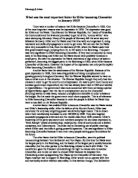Why had international peace collapsed by 1939?
Why had international peace collapsed by 1939? When Hitler came to power in 1933 he had three main aims, the abolishment of the treaty of Versailles, to expand German territory and to defeat communism. Like most of the German population, Hitler believed that the Treaty of Versailles was unjust. The treaty was a constant reminder of Germany's defeat in World War One and their humiliation by the Allies. Hitler promised that he would reverse the treaty. The terms of the treaty, although tampered with for the self-interest of 'the big 3' was meant to secure peace and so by abolishing it, Hitler had started to crack the security in international peace between nations. The treaty had taken land away from Germany and Hitler pledged to take this territory back. He wanted to unite with Austria and wanted to carve out an empire in Eastern Europe to give extra Lebensraum (living space) for Germans. For this, war was inevitable and so the chances of lasting peace diminished. A German empire carved from the Soviet Union would also help Hitler in another of his aims, the defeat of Communism or Bolshevism. Hitler was anti-communist and believed that the Bolsheviks helped defeat Germany in WW1 and still wanted to take over Germany. In the 1930s there were two incidents that really tested the League of Nations, the Manchurian and Abyssinian crisis'. Both the Manchurian and Abyssinian
Why had international peace collapsed by 1939?
Prep Why had international peace collapsed by 1939? In January 1933, Adolf Hitler came to power in Germany and immediately began to challenge the Treaty of Versailles and adapt an aggressive foreign policy which led to war. It is easy to blame Hitler for starting war in 1939. His underlying aims were already aggressive. The actions which he took in the following years all followed these three aggressive aims: to destroy the Treaty of Versailles, to unite all Germans in one country and to create a living space in Eastern Europe. For example Hitler's rearmament was part of his aims. This was contrary to the treaty of Versailles. His rearmament was not allowed as in the Treaty of Versailles it said the Army must be no more than 100,000 and conscription was not allowed. Hitler's actions such as these made countries very tense including France. In the 1930s there were two incidents that really tested the League of Nations. These are important in the road to World War two. The first one happened in Manchuria. Japan was trying to control it in their own interests for living space and for natural resources. The league did nothing to help as they did not have support from America. This showed the League's fear of Japan as well. Japan also left the League. The way the league dealt with the problem clearly showed the inability of Britain and France to handle tension and problems which
Why was the Munich Agreement signed on 29 September 1938?
Why was the Munich Agreement signed on 29 September 1938? The Munich Agreement was an agreement between Britain, France, Germany and Italy by which a part of Czechoslovakia called the Sudetenland was ceded to Germany. To understand why the agreement was signed it is necessary to look at what had been happening in Europe during the previous twenty years. After the First World War Germany had been severely punished. It had been forced to give away land and money and was not allowed to have a proper standing army. Czechoslovakia was an artificial country constructed partly from the old Austro-Hungarian Empire and as a consequence about one quarter of its population was German. During the 1930s Adolph Hitler came to power as Chancellor of Germany. He used his position to become dictator and brought about many changes in Germany. He successfully seized land such as the Rhineland and the Saar And was not stopped by any other country. He gradually built up the size of his army, navy and airforce for example, the anglo-german treaty that allowed them to increase the german navy to 35% of Britain's, and again was not stopped. He used the Luftwaffe (the german air force) in the Spanish Civil War to bomb places like Guernica. He made a pact with the other Fascist State, italy and the two tried to distablise the solidarity against germany by keeping on reasonably good terms with















